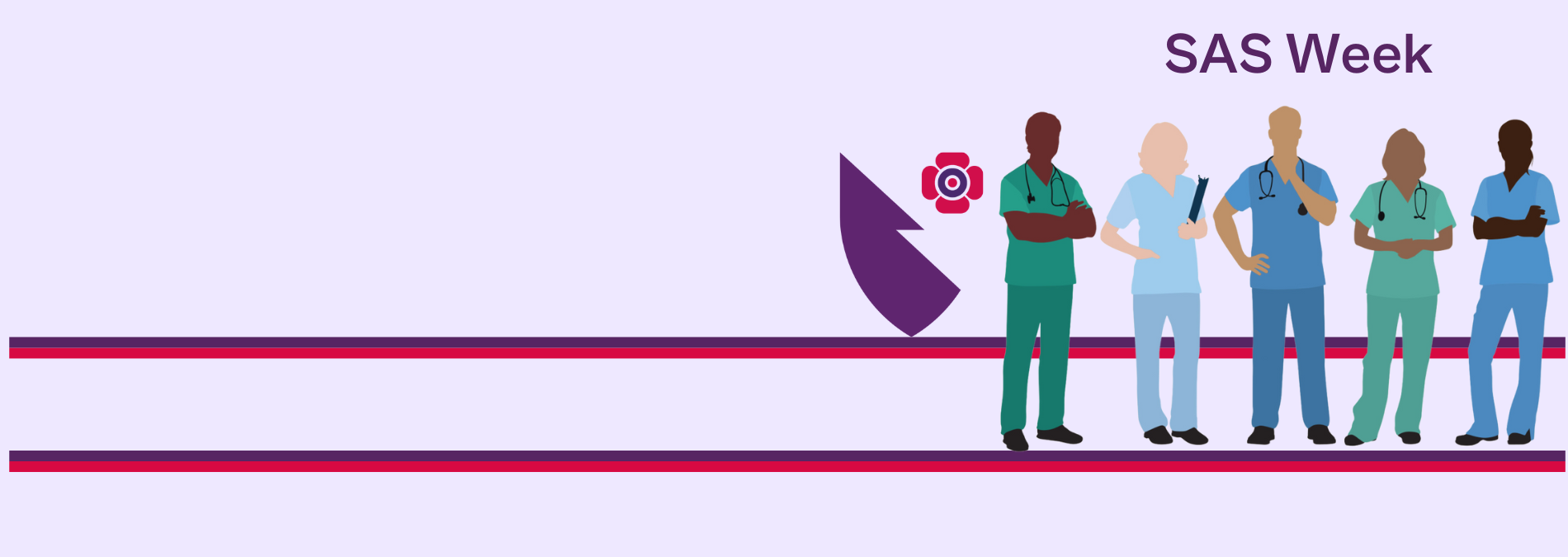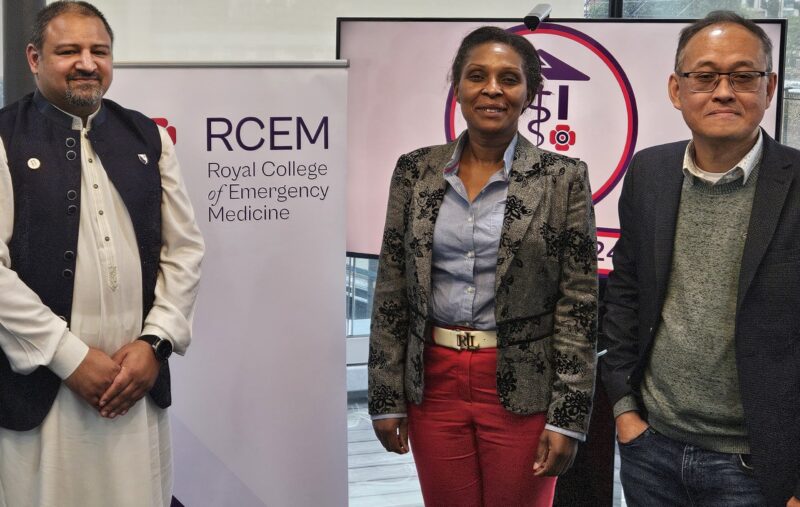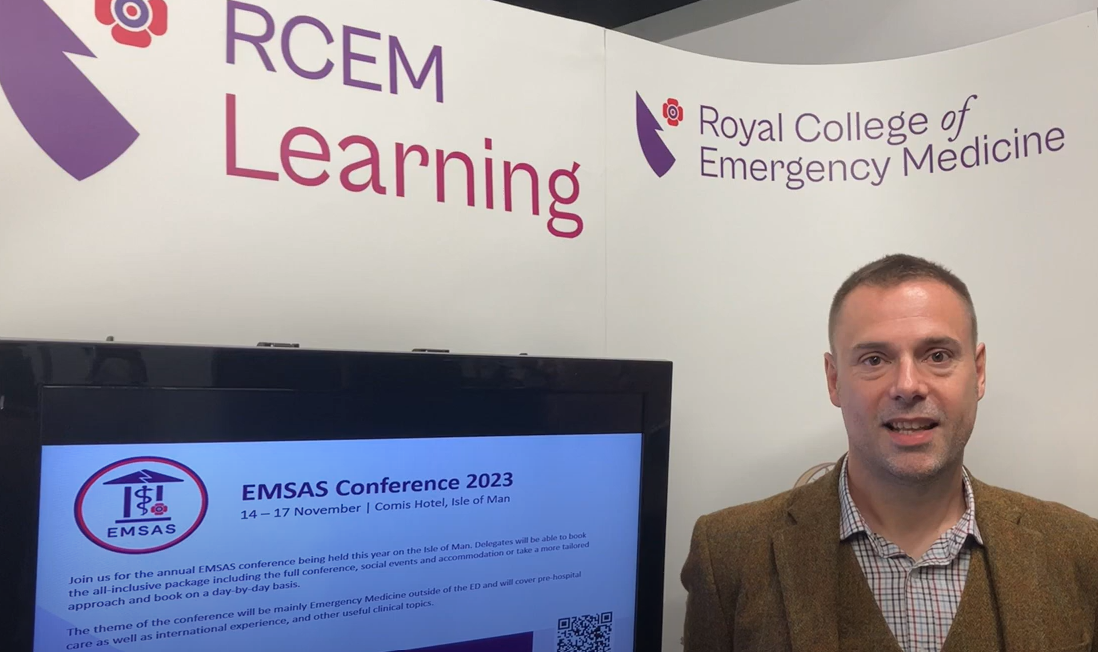
Follow the content that the Royal College of Emergency Medicine publishes each year to celebrate Emergency Medicine Specialty and Specialist doctors during SAS Week.
SAS Week is a week-long celebration dedicated to recognising and celebrating the contributions of Specialist, Associate Specialist, and Specialty (SAS) doctors. It typically takes place in mid-October.
During SAS Week, recognition is given to the vital role SAS doctors play in the healthcare system to promote the value of SAS doctors and support their career development. It’s a collaborative effort between healthcare organisations, with British Medical Association (BMA) and NHS Employers leading with content and themes.
#SASWeek24
Dr Immad Qureshi, RCEM’s Emergency Medicine Specialty and Specialist (EMSAS) doctors’ forum Chair, was interviewed by Dr Agnes Ngassa, an Emergency Associate Specialist at Hillingdon Hospital, for the SAS Week celebrations as part of the hospital’s radio and podcast broadcast.
During the interview, Dr Qureshi shares his educational journey and how his experiences shaped my career in Emergency Medicine (EM). He also explains his responsibilities as the EMSAS Chair and the competitive process that led him to this position and highlights the unique challenges faced by SAS doctors in EM and the importance of support. The role of EMSAS within RCEM is also explained and how the organisation advocates for SAS doctors to develop opportunities.


A collection of clips were also shared on RCEM’s socials for each day of the SAS Week’s themes. Dr Qureshi, Dr Agnes Ngassa and EMSAS London Representative Dr Paul Bisnar all shared their views on the topics from NHS Employers:


+ SAS Week 2023

Celebrating SAS Week: Honouring the Vital Role of Specialty and Specialist Doctors
From 9 October to 13 October, we celebrate SAS Week, an occasion dedicated to recognising and appreciating the invaluable contributions of specialty and specialist doctors in healthcare. These unsung heroes play a pivotal role in providing specialised care in our hospitals, often working tirelessly behind the scenes to ensure patients receive the best possible treatment.
We are especially proud of our EMSAS doctors – without them, our service just would not cope. Without them, we would just not have enough senior decision makers to run the EDs. Without them, we would not have the stability – they are the lumbar spine of our workforce. They have been imperative in recent months with the on-going strike action – we just would not have managed without them. It is as simple as that.
Our EMSAS doctors are not just clinicians; they are also researchers, innovators and educators. They drive medical management by conducting research, participating in clinical trials, and implementing quality improvements, being involved in managerial tasks, to help support the ED consultants with their roles.
It is well know that ED consultants hold a special relationship with EMSAS Doctors – some relationships have been established and grown over years. The EMSAS doctors I work with now used to be my Registrars when I was an SHO! They are a highly respected group and valued so much within the MDT of the Emergency Departments. Most importantly, they are our friends.
These doctors have made the commitment (and sacrifice) to not go into the traditional route of training, but to be based in one department, for a multitude of reasons, which creates constancy for them in their lives and good satisfaction. It is also encouraging to see so many EMSAS doctors turn to CESR training to progress their careers to become Consultants – this is fantastic! However, it is a brutal, long, drawn-out process which requires a lot of time and effort – this achievement is highly commendable and not easy!
A large proportion of our EMSAS workforce are from overseas – leaving their home countries to settle in the UK, some with family, some without, learning a new culture, language, behaviours and an entirely new process in healthcare – the NHS! The way they have coped with this drastic transformation and adapted so well to working here is truly amazing – it is so heartening to see them become part of our multicultural NHS and bring their own depth of knowledge and skill to the ED workforce. Our International Medical Graduates are a very special group – we salute you for supporting us and choosing us to be your work partners and family.
As we celebrate SAS Week from 9 October to 13 October, let’s take a moment to honour and appreciate the dedication, expertise, and unwavering commitment of our ED specialty and specialist doctors. Their tireless efforts, working in sometimes appalling conditions year after year, improve the lives of countless patients, support and educate our younger workforce – their contributions to the field of Emergency Medicine are nothing short of remarkable. Let’s recognise their vital role and service, and marvel at their endeavours, as they work indefatigably to continue to uphold and support our EDs. Thank you. Just… Thank you.
Next month presents another great opportunity for our EMSAS members to celebrate again as we have two events to support our SAS Doctors. On 3 November there is a CESR applicants training day in Manchester for those who intend, or are in the process of, submitting a CESR application in Emergency Medicine for entry to the Specialist Register. This is then followed by the EMSAS Conference 2023 on 14 – 17 November 2023, which is RCEM accredited for 15-CPD points. Make sure you to book now and add those to your calendars before deadlines close.
Please also check your details are correct in our IMIS member database so we can send you important reminders about how we are supporting you through EMSAS, events and with helpful notifications.
Salwa

How the Specialist Role works in my ED
I have been a speciality doctor since 2012. I got tired of training and having got involved in medical education, simulation fellowships and rota management. I became embedded in the department and had no reason to go back to training, but in 2021 I upgraded to a specialist doctor, which recognised that I was working at near consultant level with a large amount of management responsibilities.
In 2018, our department was getting busier and busier. I soon realised we were one cog in a giant urgent care system. What other providers such as 111, the ambulance service and the out of hours service did affected us and what we did affected them. To improve this, I started to work with the out of hours service, we had a collocated out of hours service and had a protocol of streaming patients to them and they could come and ask us directly for advice.
Post pandemic I started working on the 111 first programme to work closer with 111 and avoid so many referrals coming to our department. The Devon enhanced clinical validation service places ED doctors into the 111 call centre. This means that for every ten patients referred by 111 to our department five less end up physically in the department, so we manage 40% of these patients over the phone and without needing onward referral and direct the rest to their GP or other NHS services.
Through this I understand how the entire system works such as 111, the ambulance service and community urgent care. I can explain the pressures they are under to my colleagues and avoid blaming them for referrals. Instead, I understand how busy the NHS we all work in is, everyone is doing their best with the patient at the centre.
We are now expanding this pathway to create a “care coordination hub” where various members of the community urgent care team can access specialist advice from inpatient services so avoiding admission.
If I was a consultant, I would be working within Emergency Medicine completely, and this would not allow me the free reign to work across the whole urgent care system and understand how my trust is just one piece in an interconnected web of services helping patients at every step of their journey.
Michael
Your invite to the EMSAS Conference
Steve Black, EMSAS Chair (featured in the below video), invites EMSAS members to the EMSAS Conference 2023 on 14 – 17 November 2023, which is RCEM accredited for 15-CPD points.
Held this year on the Isle of Man, delegates will be able to book the all inclusive package including the full conference, social events and accommodation or take a more tailored approach and book on a day by day basis.
“We would like to welcome all non-training grade ED clinicians to the Annual EMSAS conference on the Isle of Man this year. The theme of the conference will be mainly Emergency Medicine outside of the ED and will cover pre-hospital care as well as international experience. We have also made an attempt to include other useful clinical topics normally less accessible to the SpD group,” said Dr Sudipto Ghosh, who is on one of the local organising teams.
Check your details are correct in our IMIS member database to avoid missing out on important reminders.



Dr Jo-Anna Robson, ED Associate Specialist at Southport Hospital, Mersey and West Lancashire Teaching Hospitals Trust, explains how being a SAS doctor and a medical lead in EPRR has presented challenges but is also extremely rewarding.


Thank you to Dr Ciara Cruise, SASG AED and Acute Med, Medical Examiner, Southport District General Hospital, North West and Mersey, for sharing her story about how SAS has shaped her healthcare career.
#SASWeek23 Dr Ciara Cruise shares her story about how SAS has shaped her healthcare career. What great choices have you discovered as a #SASDoctor? 📩 Share them with us by reply or DM! @EMSAS_RCEM @RCEMvp_Salwa pic.twitter.com/qT9R2SUeyy
— Royal College of Emergency Medicine (@RCollEM) October 10, 2023
In the second video by Dr Jo-Anna Robson, she explains how being a SAS doctor and SIM Lead brings her great satisfaction as she helps to train new generations of doctors.


